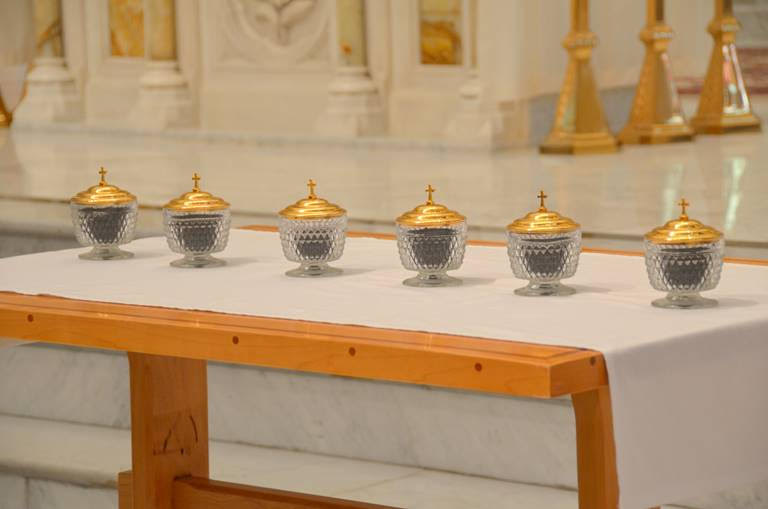
PORTLAND, Maine — “Today, marking as it does the beginning of Lent, reminds us that we spend these days reflecting on how we are living with the God who called us into being and will bring us, we pray, to eternal life.”
Bishop Robert P. Deeley spoke on Feb. 26 in Portland for the celebration of Ash Wednesday Mass that marked the start of Lent, a period of prayer and penance leading up to the celebration of Christ’s death and resurrection.
“We remind ourselves that we are dust, and unto dust we shall return. In the marking of our foreheads with the ashes today, we remind ourselves how we got from ashes to life. It is God’s creative love which makes it possible, and it will be his abundant love which marks the next stage of our life’s journey, that which takes us back once again from life to ashes,” the bishop told the assembly.
During the Mass, the bishop blessed the ashes which are made from burned palms of the previous year’s Palm Sunday. While the ashes symbolize penance and contrition, they are also a reminder that God is gracious and merciful to those who call on Him with repentant hearts.
The ashes were then placed on people’s foreheads in the form of cross, while priests and other distributors of the ashes said, “Remember that you are dust, and to dust you shall return” or “Repent, and believe in the Gospel.”
The bishop said fasting, prayer and almsgiving are key to understanding Lent. These practices are intended to help the faithful achieve a conversion of heart by focusing more fully on deepening their relationship with Christ.
On Ash Wednesday, Catholics fast and abstain from meat. That abstinence continues during the Fridays of Lent. In addition, many Catholics fulfill a personal fasting during the entire Lenten season, going without to acknowledge what we have and the source of all goodness.
“We will become more aware of our dependence on God, and his goodness to us, by foregoing some of those things that are an integral part of our lives,” said the bishop. “We will live with less so we can be attentive to the fullness that God alone can give us.”
Through prayer, the bishop said, Lent is a time to refocus on how God wants us to live, spending time with God and asking him for guidance. What is gained from those sacrifices can be given to those who are in need through almsgiving.
“We do that through sharing ourselves and the fruit of the penance we do by giving to others,” he said.
One way in which Catholics care for each other during Lent is by participating in the Catholic Relief Services (CRS) Rice Bowl program, which benefits the poor around the world. Seventy-five percent of the money collected goes towards Catholic Relief Services’ worldwide ministry, while 25 percent is used within the diocese.
The bishop reminded those gathered to think about the “why” when giving something up for Lent.
“It is not to help us to lose weight or be healthier. There’s nothing necessarily wrong with these results, but that makes our sacrifices more about ourselves. Our sacrifices are really intended to draw us closer to the Lord Jesus, to come to know him better, to ask him to guide us in life. The true purpose of giving something up for Lent is to recognize our relationship with God. Whatever we choose to do for Lent should always connect us with the Lord.”
A special Lent section has been created on the Diocese of Portland’s website. It features Mass times; prayer opportunities, including the Stations of the Cross; special event listings; Scripture study and other faith-enriching offerings at parishes; a “Saints of Lent” section; Scripture reflections; retreat information; Lenten messages from Pope Francis; and more. Visit www.portlanddiocese.org/lent-resources.







